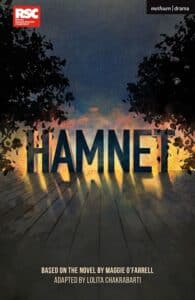The new play “Hamnet” suggests a strong influence on “Hamlet”
William Shakespeare and his wife Anne Hathaway had three children: Susannah and the twins Judith and Hamnet. In 1596, when the twins were 11, Hamnet died. A week after his son was buried in their hometown of Stratford, Shakespeare was back in London, working on a new play.
It seems odd to us today that the man would have hurried back so quickly to London after the funeral of his child. I suspect it might have seemed odd even in 1596. Your wife is grieving, your daughters are grieving, your still-living parents are grieving, and you rush back to work. We don’t know what might have been going on in Shakespeare’s mind, as he left no written record of his thoughts about his son’s death.
Or did he?

But why would Shakespeare have done that? He could have just as easily kept the historical name and written Amleth, Prince of Denmark. Early on, people understood the resemblance between “Hamlet” and “Hamnet.” And over the centuries, many wondered if Shakespeare was trying to memorialize his son.

Maggie O’Farrell
The story obviously intrigued novelist Maggie O’Farrell (I would say British novelist, and she lives in Britain, but her name is Irish and she resides in Edinburgh). She wrote the much celebrated novel Hamnet, which won a number of literary awards. It’s a story about the Shakespeare family—how Will and Anne met and married, their children, their life together in Stratford and apart when Will went to London to work. It focuses on the children and the death of Hamnet (from the plague, which was a recurring disease for hundreds of years before and after Shakespeare).
Actress and playwright Lolita Chakrabarti adapted the novel into a play of the same name. It premiered in Stratford at the Swan Theatre this past April, a production of the Royal Shakespeare Company and Neal Productions. It is now scheduled for London’s Garrick Theatre, beginning Oct. 1.
Unless I know the story backward and forward (like the musical Les Misérables), I like to read the text of the play I’m going to see. That’s especially true if it’s a drama. I read the script for The Ferryman by Jez Butterworth a few days before the performance, and it was enormously helpful when I actually saw the play.

Lolita Chakrabarti
In the case of Hamnet, the story becomes a haunting tale of grief, much of it told from Anne Hathaway’s perspective. She’s been away, and she rushes home to care for her daughter Judith suffering from the plague, only to find Judith recovering and Hamnet dying. Word is sent to London to Shakespeare, and he rushes home, but it’s too late. The boy has died.
Without giving away too much of what happens next, suffice it to say that both parents grieve, grieve deeply, and deal with their grief in very distinct ways. Anne finds William’s almost walled-off feelings to be disconcerting, until she learns firsthand that her husband felt their son’s loss as deeply as she did. And she discovers it in a very Shakespearean way.
It’s a moving story. A play adapted from a novel can never include everything the novel contains, but Chakrabarti has been faithful to O’Farrell’s story and shaped it into what is the essential plot and character development.
Scholars will never know for sure whether the death of his son influenced Shakespeare when he wrote Hamlet, but writers and readers of the novel and the play will know better.
Photo by faungg’s photos, Creative Commons, via Flickr. Post by Glynn Young.
How to Read a Poem uses images like the mouse, the hive, the switch (from the Billy Collins poem)—to guide readers into new ways of understanding poems. Anthology included.
“I require all our incoming poetry students—in the MFA I direct—to buy and read this book.”
—Jeanetta Calhoun Mish
- Poets and Poems: Christina Cook and “Roaming the Labyrinth” - April 22, 2025
- Longfellow’s “Paul Revere’s Ride”: Creating a National Legend - April 17, 2025
- Poets and Poems: Katie Kalisz and “Flu Season” - April 15, 2025


Bethany says
How interesting. Thanks so much for sharing this with us.
I like too how you read a play before attending. That would have been helpful when I went to see “The Winter’s Tale” some years back.
Megan Willome says
I think I might actually enjoy the story better as a play. When reading the book, I especially wanted to see the ending. A staged version would certainly make that possible.
The other great part of the book that I don’t think would adapt well is the chapter on the plague spreading. Unforgettable.
Thanks, Glynn!